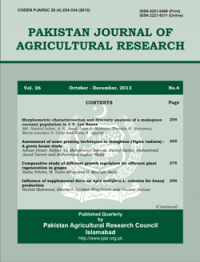Effect of Pasteurization Treatments on Leuconostoc mesenteroides Strains Isolated from the Pakistani Foods
Effect of Pasteurization Treatments on Leuconostoc mesenteroides Strains Isolated from the Pakistani Foods
Sohaib Afzaal1,4*, Usman Hameed2, Nasir Ahmad3, Klas Udekwu4, Paulina Pastuszek4 and Muhammad Saleem Haider1
ABSTRACT
Leuconostoc mesenteroides are well known for their probiotic effects and starter culture properties. Thermostability of starter cultures is a key factor for food product development. Current study was planned to test the thermodurability of seven strains of Ln. mesenteroides using pasteurization treatments. Both types of pasteurization treatments including High Temperature Short Time (HTST) and Low Temperature Long Time (LTLT) were applied to all of the strains. On applying LTLT treatment, maximum viability was found in the BSM-43 (42.84%) while minimum viability was shown by CYG-362 (26.10%). In case of HTST treatment maximum viability was shown by BSM-43 (41.67%) while minimally viable strain was CYG-362 (19.83%). Concludingly, Ln. mesenteroides strains tested in current study were more susceptible to LTLT pasteurization rather than HTST. Probiotic potential of these strains is being evaluated and employment of these strains in food fermentations is future prospect of the study.
To share on other social networks, click on any share button. What are these?







